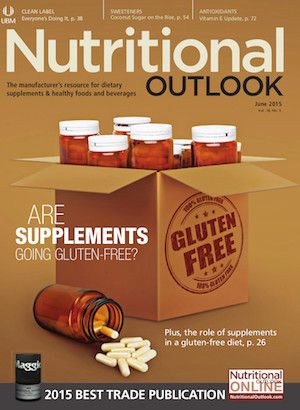Vitamin E Research Ramps Up
A number of catalysts are now spurring interest in this shortfall nutrient.

The 2015 Dietary Guidelines for Americans report established vitamin E as a shortfall nutrient, alongside six others. In fact, according to Andrea Wong, PhD, vice president of scientific and regulatory affairs at the Council for Responsible Nutrition (CRN; Washington, DC), as many as 93% of Americans fall short on this essential nutrient when it comes to intake from diet alone. “Use of supplements has helped decrease that figure down to about 60%,” she says, “but it’s definitely a nutrient the American population is not getting enough of.” And researchers are interested in the potential fallout.
Cognitive Function
Research out of Oregon State University’s Linus Pauling Institute1 outlined some recent findings-most notably, vitamin E’s significance during fetal development and throughout the first years of life, the correlation between adequate intake and dementia later in life, and the difficulty of evaluating vitamin E adequacy through blood level measurements alone.
The review of multiple studies, published in Advances in Nutrition and led by vitamin E expert Maret Traber, revealed that inadequate vitamin E is associated with increased infection, anemia, stunting of growth, and poor outcomes during pregnancy for both infant and mother, and neurological disorders and muscle deterioration in children with an overt deficiency. On the other hand, increased vitamin E concentrations at birth were associated with improved cognitive function by age two. The nutrient was also found to possibly slow Alzheimer’s progression, increase cognitive function, and even reduce risk of dementia by 47%.
“It’s important all your life, but the most compelling evidence about vitamin E is about a 1000-day window that begins at conception,” Traber said, adding that a multivitamin with the recommended daily allowance of vitamin E could go a long way towards addressing the shortfall.
Heart Health
Further interest in vitamin E is reflected in the Canadian and U.S. government’s Dietary Reference Intake (DRI) review. “Only four nutrients were selected in this review, among a number of different nominations,” explains Wong. “This indicates that the governments recognize that there’s significant and relevant data on this nutrient since the last DRI review and that this research is relevant to public health.”
Specifically, much of the most recent vitamin E research centers on implications for cardiovascular health. One recent study, published in February in the European Journal of Clinical Nutrition2, reviewed 12 human studies conducted between the years of 2000 and 2013. The goal was to examine the nutrient’s effect on C-reactive protein levels, a marker of chronic inflammation and a predictor of future cardiovascular disease.
Analysis showed that alpha- and gamma-tocopherols yielded a significant reduction in C-reactive protein levels, to the tune of 0.62mg/l. While the mechanism is not completely known, the conclusion was clear: “It seems that vitamin E supplementation may be a good strategy for decreasing inflammatory conditions in susceptible people,” researchers stated in their report, calling for additional research via a randomized controlled trial.
Another study, published in April in Nutrition, Metabolism & Cardiovascular Diseases3, examined 16 randomized, controlled trials of vitamin E treatment as it relates to cardiovascular events, ranging in size from 100 to over 39,000 participants. The meta-analysis examined supplementation with vitamin E alone (as alpha-tocopherol), as well as its effects when combined with other antioxidant agents like a multivitamin or vitamin A, vitamin C, beta-carotene, polyunsaturated fatty acids, or selenium. Researchers noted a wide variety of effects from vitamin E supplementation when combined with other antioxidants in various studies, ranging from beneficial to harmful.
Researchers found that when supplemented alongside other antioxidants, vitamin E was ineffective in reducing incidence of heart attack, and in some cases, could be considered harmful. But when supplemented alone, vitamin E reduced heart attack by about 20%.
Tocotrienols
Tocopherol isn’t the only player when it comes to vitamin E research. Heightened interest in tocotrienols is also contributing to the increased attention given to vitamin E overall, says Barrie Tan, president of American River Nutrition Inc. (Hadley, MA). “Approximately half of all vitamin E tocotrienol research of the last 30 years was published in the last five years,” he says, adding that most of this research deals with heart-related diseases, diabetes, and cellular health.
One such study, published in the British Journal of Medicine and Medical Research in 20144, found that 125–750 mg/day of tocotrienol coupled with a healthy diet can decrease lipid levels significantly after just four weeks. Researchers found that the optimum dose of 250 mg decreased total cholesterol in 31 hypercholesterolemic subjects by 15%, LDL cholesterol by 18%, and triglycerides by 14%.
Another study examining tocotrienols, appearing in theJournal of Clinical and Experimental Cardiology5, addressed its effect on lipids and inflammation simultaneously. Researchers convened two groups of elderly subjects, one with normal lipid levels and the other with elevated lipid levels. After six weeks of supplementation with tocotrienol, antioxidant polyphenols, and niacin, the group with normal lipid levels experienced a significant drop in inflammatory markers nitric oxide, C-reactive protein, and gamma-glutamyl-transferase, as well as an increase in total antioxidant status. (Nitric oxide, when present in normal levels, is anti-inflammatory, but researchers posit that elevated levels of nitric oxide, especially in the elderly, are pro-inflammatory.) The group with the elevated lipid levels experienced the same effects, in addition to a drop in LDL cholesterol (20%–28%) and triglycerides (11%–18%).
An Essential Nutrient
“This research and others are definitely promising,” says Wong. “But we have to remember that, primarily, vitamin E is an essential nutrient and we need it for our daily cellular and bodily function. Anytime we see new research that shows an added benefit, whether it’s for heart health or for inflammation, it’s a bonus.”
Also read:
Vitamin E's Alternative Sources
Vitamin E Status Linked to Miscarriage?
Alpha-Tocopherol Doesn’t Break Down Other Vitamin E Forms
References
- Traber M, “Vitamin E inadequacy in humans: causes and consequences,” Advances in Nutrition, vol. 5 (September 2014): 503-514
- Saboori S et al., “Effect of vitamin E supplementation on serum C-reactive protein level: a meta-analysis of randomized controlled trials,” European Journal of Clinical Nutrition. Published online ahead of print February 11, 2015.
- Loffredo L et al., “Supplementation with vitamin E alone is associated with reduced myocardial infarction: A meta-analysis.” Nutrition, Metabolism & Cardiovascular Diseases, vol. 25, no. 4 (April 2015): 354-363
- Qureshi AA et al., “Dose-dependent modulation of lipid parameters, cytokines and RNA by delta-tocotrienol in hypercholesterolemic subjects restricted to AHA Step-1 Diet,” British Journal of Medicine and Medical Research, vol. 6, no. 4 (December 2014): 351-366
- Qureshi AA et al., “Nutritional supplement-5 with a combination of proteasome inhibitors (resveratrol, quercetin, delta-tocotrienol) modulate age-associated biomarkers and cardiovascular lipid parameters in human subjects,” Journal of Clinical and Experimental Cardiology, vol. 4, no. 3 (March 2013): 238
Photo © iStockphoto.com/timsa





















